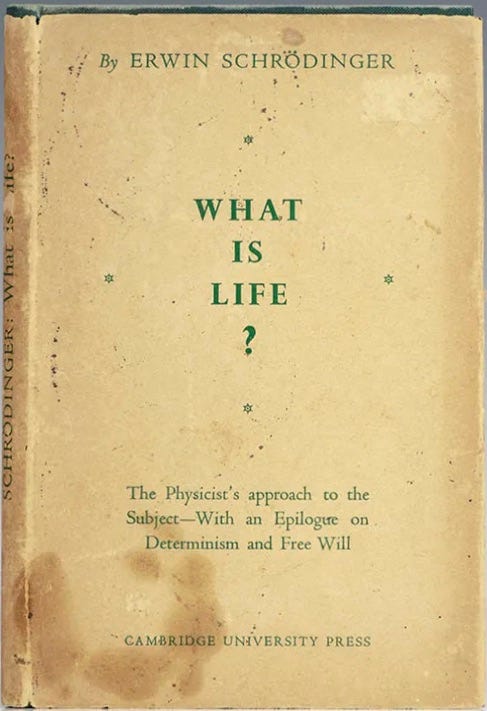Personages: Historical: Erwin Schrödinger
Books: Real: What Is Life?
Life
Chance
At Home with the Glynns, Chapter 18:
Among those fugitives was the Austrian theoretical physicist Erwin Schrödinger, formerly a professor at the universities of Berlin and Graz. Not long after Andy and Rosetta reached Ireland, Schrödinger gave a series of lectures on biology under the auspices of the Dublin Institute for Advanced Studies […] and a year later Schrödinger published his lectures as a slim book with the title What Is Life?
Wikipedia, “What Is Life?”:
The lectures attracted an audience of about 400, who were warned “that the subject-matter was a difficult one and that the lectures could not be termed popular, even though the physicist’s most dreaded weapon, mathematical deduction, would hardly be utilized.” Schrödinger’s lecture focused on one important question: “how can the events in space and time which take place within the spatial boundary of a living organism be accounted for by physics and chemistry?” […]
In a world governed by the second law of thermodynamics, all isolated systems are expected to approach a state of maximum disorder or entropy: an irreversible state of thermodynamic equilibrium, where free energy is no longer available to do work. It has been argued that, since life approaches and maintains a highly ordered state, it violates the aforementioned second law, implying that there is a paradox. However, since the biosphere is not an isolated system, there is no paradox. The increase of order inside an organism is more than paid for by an increase in disorder outside this organism by the loss of heat into the environment. By this mechanism, the second law is obeyed, and life maintains a highly ordered state, which it sustains by causing a net increase in disorder in the Universe. In order to increase the complexity on Earth—as life does—free energy is needed, and in this case is provided by the Sun.

At Home with the Glynns, Chapter 18:
She was on a self-propelled downward spiral, and she couldn’t see how to end it. Fortunately, chance intervened.
Renée Néré in Colette’s La Vagabonde (translated by Charlotte Remfry Kidd):
It is the dangerous hour of clear understanding. Oh, for a kindly hand to tap at my door! Oh, for a face to come between me and the made-up counselor spying on me out of the mirror! Chance, my friend and master, will surely deign to send again, to help me, the familiar devils of his unruly kingdom! l have no faith, except in him—and in myself. Particularly in him, for, when I sink, he fishes me up again, and grips and shakes me like a rescuing dog, whose teeth every time meet in my skin! So that every time I sink, I do not expect a final catastrophe, but only some adventure, some trivial, commonplace miracle which, like a sparkling link, may close up again the necklace of my days.
See also:
Books, Real and Fictional TG 99, TG 793; Books: Covers TG 156; Books: Care of (How to Open) TG 586; Ancient Myths for Modern Youth TG 649; The Films of Gregory TschudinTG 705, TG 736, TG 776; Making Your Self . . . and Dinner TG 777
Chance (see also Coincidence; Fate; Luck) TG 9; TG 162, TG 570
Life: Metaphors and Similes for TG 40, TG 55, TG 60; Phases of TG 89; Life and Death TG 92; Yearning for Another, Different, Better TG 100, TG 104; Life: Its Vicissitudes TG 146; Life Imitates Art (More or Less) TG 153; Stages of: Puberty TG 164; Life: The Nature of It, and Ways One Might Live One’s TG 382; Life: Its Vicissitudes, Its Shames and Humiliations, Its Follies, Its Burden of Pain, Care, and Misery TG 376; Attitudes Toward TG 523; Carpe Diem TG 523; Public versus Private, On Display versus Out of Sight TG 691
Personages, Historical: Busby Berkeley TG 429, W. C. Fields TG 456, Dwight “Ike” Eisenhower TG 546, Miss Rheingold TG 565; Werner Heisenberg TG 623
Have you missed an episode or two or several?
You can begin reading at the beginning or you can catch up by visiting the archive or consulting the index to the Topical Guide. The Substack serialization of Little Follies begins here; Herb ’n’ Lorna begins here; Reservations Recommended begins here; Where Do You Stop? begins here; What a Piece of Work I Am begins here; At Home with the Glynns begins here.
You can listen to the episodes on the Personal History podcast. Begin at the beginning or scroll through the episodes to find what you’ve missed. The Substack podcast reading of Little Follies begins here; Herb ’n’ Lorna begins here; Reservations Recommended begins here; Where Do You Stop? begins here; What a Piece of Work I Am begins here; At Home with the Glynns begins here.
You can listen to “My Mother Takes a Tumble” and “Do Clams Bite?” complete and uninterrupted as audiobooks through YouTube.
You can ensure that you never miss a future issue by getting a free subscription. (You can help support the work by choosing a paid subscription instead.)
At Apple Books you can download free eBooks of Little Follies, Herb ’n’ Lorna, Reservations Recommended, and Where Do You Stop? and What a Piece of Work I Am.
You’ll find overviews of the entire work in An Introduction to The Personal History, Adventures, Experiences & Observations of Peter Leroy (a pdf document), The Origin Story (here on substack), Between the Lines (a video, here on Substack), and at Encyclopedia.com.


